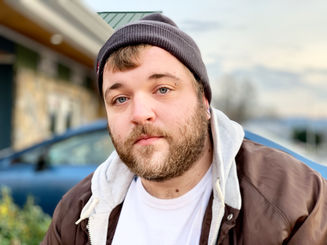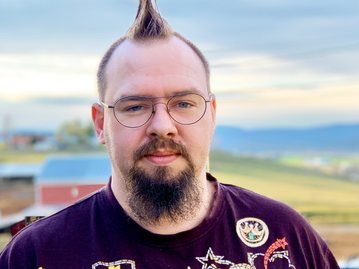|
Former residents of the program talk about life and work after Gemeinschaft Home in the Year of COVID-19.  Former residential program participant, Daniel Canterbury. Former residential program participant, Daniel Canterbury. he future is never entirely clear for anyone—no matter what direction we take or what choice we make in life—but the prospect is all the more uncertain for the majority of individuals coming out of incarceration. Finding a stable place to live and a job, reconnecting with estranged family members and loved ones, and maintaining sobriety (for those who struggle with addiction) are formidable obstacles but doing so in 2020 has presented an even greater challenge for those making a transition back into the community. The economic impact of the COVID-19 pandemic—leading to millions of job layoffs and eviction notices—is made all the worse by the staggering number of infections and deaths, that have overburdened the healthcare system and ravaged families with the loss of loved ones, in the wake of the most significant healthcare crisis in 100 years. This was the situation facing former residents Daniel Canterbury, 28, and Jeremy Hill, 36, when they finished the Gemeinschaft Home program last spring. Yet, their time spent in the program has helped to provide a solid foundation for a new start, and so far, they are still on stable ground.  Former residential program participant, Jeremy Hill. Former residential program participant, Jeremy Hill. While they both had been incarcerated for drug-related convictions, neither struggled with addiction, which is often the focus of many individuals who go through program. But both emphasize how the house structure and program curriculum provided a chance to gain some valuable tools for living, while also working to save money to live independently after they finished. Taking on leadership roles as senior house representatives, Canterbury and Hill actively participated in the community aspect of the program and helped to orient new residents, manage household chore schedules, and take on extra responsibilities, such as being the house cook on the weekends. Both men have a background in the restaurant and food industries, and they worked in related jobs while they were living at Gemeinschaft Home. Plans after the program included establishing a food truck business for Hill, who finished in February, and assisting with the launch of a new local restaurant location for Canterbury, who exited the program in late March. However, the Covid-19 pandemic forced both to switch gears and find an alternative. Luckily, both have found a place to thrive, despite the enormous impact on the food service industry resulting from the COVID-19 pandemic over the past nine months. Canterbury is a cook locally at the Thunderbird Diner in McGaheysville, nearby his home and family in Elkton. Hill now lives in Abingdon, Virginia, and is the sous chef at Commonwealth Senior Living. There are still barriers that each man faces day-to-day, and both are still working—nearly a year later—to get their driver license reinstated. Hill points out that limited hours and appointments at the DMV make it nearly impossible to complete the road test, as Saturday is his only day off each week, even though he finished the written test some time ago. Canterbury supports several children, and his partner is currently expecting another child in the upcoming year. He is still repaying court fines, and he will come off probation when he does so, but he continues to make steady progress. When asked to reflect on their time in the Gemeinschaft Home program, both pointed to the community structure and how the individuals in the house function as a unit. Both Hill and Canterbury benefitted from and contributed to the family-structure, whether they were helping another resident fill out paperwork or assisting a new resident to learn the rules and to find his way around the house. Canterbury points out, “Gemeinschaft Home provided a community in which I could apply myself and gave me a sense of acceptance that I would not have had coming out of jail with nothing.” Hill referred to his experience as a stepping-stone between prison and life in the community, one that he urgently needed to soften what would otherwise be a very stressful moment. He says, “This is a good decompression, too, because we are coming out from being told when to eat, when to work, when to wake up, when to take a shower to…boom…life!” He adds, “You worry about how society is going to look at you, too, at first, when you first get out and you think about that like, ‘Man, is it going to be hard to get a job? What’s it going to be like now?’ I was stressed, but every day got less and less stressful.” The two men became friends while in the program, and still keep in touch. They both also share the same goal—to live a normal life again. To the broader community, Hill says, “We’re just guys trying to start over and get some structure. We’re not all bad people; we just made a bad decision. I am here to succeed and to move on with my life, and that’s all I need to do.” Comments are closed.
|
Archives
August 2023
|